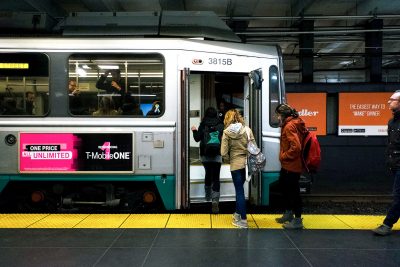Cities and towns across Massachusetts may soon be eligible to receive $200 million in funds for infrastructure improvements as a result of Gov. Charlie Baker’s latest proposal to improve transportation statewide.
The Massachusetts legislature must approve the proposal before the funding will become available.

The proposal, announced by Baker’s office on Jan. 24, seeks $200 million to fund qualifying local transportation projects. The funds would be available to all 351 cities and towns in Massachusetts in the fiscal year — which restarts every July 1 — beginning in 2021, according to a state press release.
This money comes through Massachusetts’s Chapter 90 program, which reimburses municipalities on projects undertaken to improve the state’s capital, such as highways and roads.
The Massachusetts Department of Transportation will hand out the funds, the amount of which to be predetermined by a formula that takes into account factors within each municipality including population, employment and miles of road.
Baker said in the press release municipalities would have the freedom to determine which transportation projects are most important in their individual cities and apply the funding at their discretion.
“Chapter 90 funding helps every city and town in Massachusetts make infrastructure upgrades to local roads and bridges,” Baker said in the press release, “strengthening the Commonwealth’s transportation system.”
The administration maintains a strong partnership with municipalities, Lt. Gov. Karyn Polito said in the press release.
“Chapter 90 funding and unrestricted general government aid are key supports that allow local leaders to address unique needs within their neighborhoods,” Polito said. “We look forward to working with the Legislature to pass this bill.”
Transportation issues have been at the center of Baker’s administration since the beginning of his first term in 2015, according to the press release, and the governor’s office has released $1.16 billion in funding through Chapter 90 to date.
Baker also made several mentions of transportation as an administration priority in his 2020 State of the Commonwealth address, particularly in regards to reducing greenhouse gas emissions produced by the transportation sector.
“Greenhouse gas emissions from transportation have been on the rise for decades and now represent 40 percent of this state’s total emissions,” Baker said in the address. “Unless we take on transportation, we won’t meet our objectives.”
In addition to these Chapter 90 funds, Baker has also filed for various transportation improvements in the past year, including an $18 billion transportation bond for improving roads, bridges and transit services.
This bond, proposed by the Baker-Polito administration in July last year, offers changes to facets of the Massachusetts transportation system, including more environmentally sustainable improvements.
The most recent Chapter 90 funding proposal was originally filed as part of the bond, but has been separated and refiled by the administration to ensure a timely release of funds before the beginning of the construction season, according to the press release.
Baker has also announced other transportation reforms including an additional $135 million in operating funds for the T in the budget for the 2021 fiscal year, as well as regulatory legislature for Transportation Network Companies.
“We know these are big, complicated issues, but we urge the legislature to act as quickly as possible on these bills,” Baker said in his speech. “The sooner we have access to both the tools and the funding, the sooner we can make our transportation system safer, better and more reliable.”
Taryn Braz, 23, of Brighton said she thinks investing in road infrastructure is important.
“You do see a lot of roads with potholes or just weird stuff,” Braz said. “There are a lot of people that drive in and out of the city. It’s probably best to improve the road for them.”
Carli Schmidt, 24, of Brookline said she supports the initiative and hopes the state will take environmental concerns into account when renovating highways and roads.
“I don’t drive, so I don’t actually know the day-to-day what’s it’s like,” Schmidt said. “But I feel like it’s only progress for a city.”
Brianna Fruciano, 24, of Woburn said she notices many potholes in her neighborhood, among other problems.
“In the city, it seems to just be more that lights aren’t really clear,” Fruciano said. “And the division of the roads isn’t marked up that well.”














